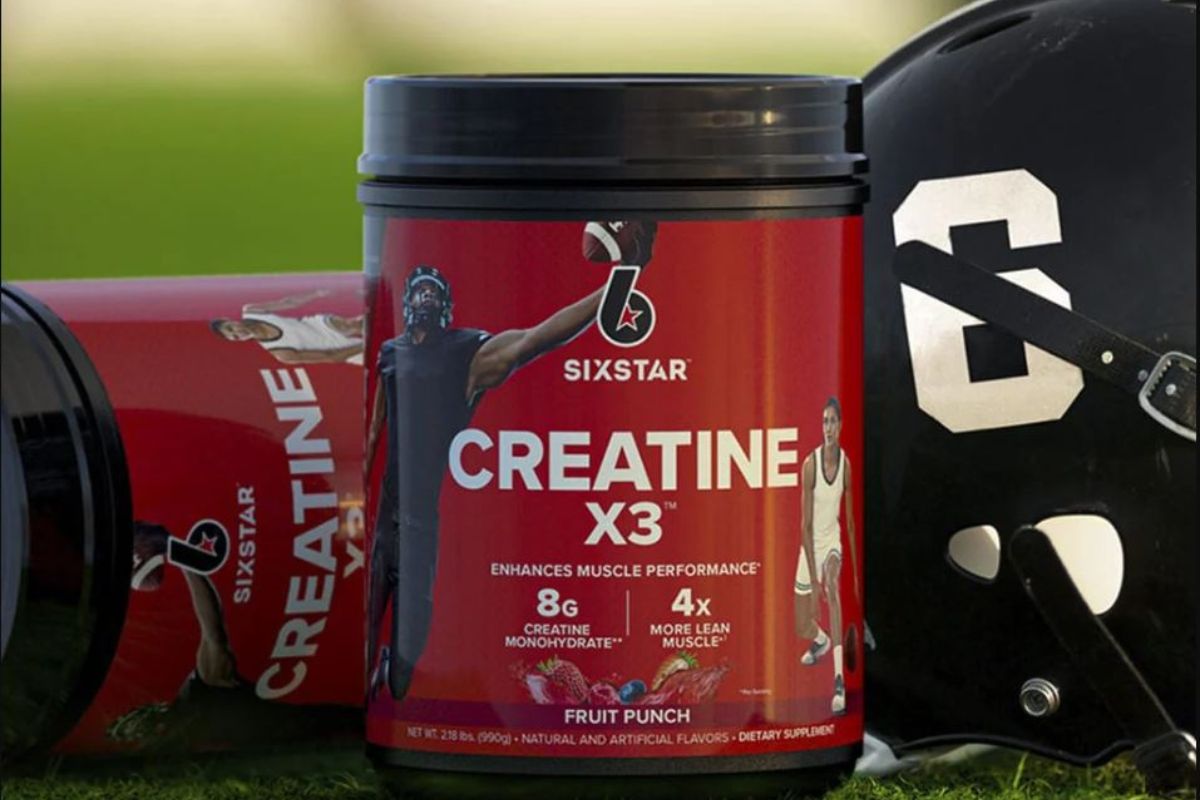Creatine is used as a supplement often used to improve athletic performance. It may also boost brain function, fight certain neurological diseases, and accelerate muscle growth. Let’s explore the foods that contain creatine:
Creatine is naturally found in the body and serves as a vital component in energy production. Synthesized predominantly in the liver and kidneys, it is then distributed to various tissues, particularly muscle cells. Creatine plays a critical role in powering short bursts of high-energy activities like sprinting or weightlifting. Its significance extends beyond athletes; it's essential for overall muscular health and cognitive function.
Before we discuss about the foods that contain creatine, let’s start by decoding what creatine is and what does it do?
Table of content
What is Creatine?
Creatine is an important substance in our bodies that helps give energy to muscles. There are two kinds: creatine monohydrate and creatine nitrate. Only a tiny bit of creatine is in our blood, but most of it, about 95%, is in our muscles.
The process of creatine formation starts with two amino acids, glycine and arginine, that undergo a series of chemical reactions that lead to the formation of creatine.
These reactions occur in various organs, mainly pancreas, liver and kidneys and involve enzymes like Arginine: glycine amidino transferase (AGAT) and Guanidinoacetate methyltransferase (GAMT).
The major role of creatine is to support the body during intense bursts of physical activity by providing rapid energy. People often use creatine to improve how well they do in sports because it helps increase the energy stored in our muscles.(1)
Also Read: Creatine Powder Vs Creatine Pill – What is Better?
What is the role of Creatine in our body?
1. ENERGY SOURCE
Adenosine triphosphate (ATP), also known as “energy currency” of cells is the main source of energy during high intense exercise. Cells in our body uses ATP for energy by losing a high-energy phosphate and changes into Adenosine diphosphate (ADP).
In this dynamic process, creatine increases the overall pool of phosphocreatine for recycling ADP to ATP. Creatine supplementation results in more energy available for high intensity exercise in turn enhancing strength and power output.(2)
2. WEIGHT GAIN
The main reason why body increases weight using creatine is by water retention. Your muscles hold on to water making you feel bloated or puffed typically around your arms, legs, and stomach. You can gain about two to five pounds due to retention of water.
Although creatine can cause some water weight gain, research has found that creatine can effectively supplement for endurance and strength, and consequently, your body may increase in muscle strength and size.(2)
Also Read: Is Creatine Good for Runners?
3. ATHLETIC PERFORMANCE
Creatine has the potential to improve performance involving extreme and intense activity in short period, particularly during repeated bursts. On top of that creatine could boost the effects of resistance training, on body mass and strength.(3)
4. METABOLISM
Children and young adults suffering from glycine amidinotransferese (GAMT) deficiency or guanidinoacetate methyltransferase (AGAT) deficiency- disorders of creatine synthesis have been treated with creatine supplementation.
Creatine deficiency is also associated with conditions, such as Chronic Obstructive Pulmonary Disease (COPD), Congestive Heart Failure (CHF), diabetes, fibromyalgia, muscle atrophy, multiple sclerosis (MS) and osteoarthritis.
Taking creatine supplements can mitigate the severity of creatine deficiency disorders. Taking creatine can also improve muscle condition and reduce fatigue in patients with muscular dystrophy.(4)
5. COGNITIVE ABILITY
While creatine’s influence on muscles is widely recognized, it has gaining prominence on impacting brain health and cognitive function. For the relentless energy demand of the brain, creatine acts as a supplier of quick and efficient energy for cognitive tasks.
Studies suggest that creatine supplementation might enhance working memory, information processing speed, and overall cognitive performance, making it a potential ally for anyone looking to boost mental acuity.(5)
6. CELL SIGNALLING
Creatine increases satellite cell signalling, aiding muscle repair and growth.(6)
7. HORMONE LEVELS
Creatine has been shown to increase anabolic hormone that aid in muscle growth. IGF-1 an anabolic hormone increases with creatine supplementation.(7)
Also Read: How to Load Creatine? The Ultimate Guide!
8. MYOSTATIN LEVELS
New muscle growth can be slowed or inhibited by elevated levels of the protein myostatin. Supplementing with creatine can reduce these levels, improving growth potential.(8)
What are the foods rich in Creatine?
1. Chicken

One solid, natural creatine source is chicken, which provides a stable, natural source of creatine. Chicken breast contains 2.2 grams of creatine per raw kilogram and approximately 443 milligrams per cooked serving.
A serving of four ounces of chicken breast has 25.4 grams of protein and 2.96 grams of fat.(11)
Chicken thighs contain 2.5 grams of creatine per raw kilogram and an unknown amount per cooked serving.
Also Read: Can I Mix Creatine With Pre Workout?
2. Ground Beef
Ground beef has 2.5 grams of creatine per raw kilogram of meat and approximately 511 milligrams per cooked serving. A three-and-a-half-ounce serving of ground beef will also give you 26 grams of protein and 11 grams of fat.(10)

3. Steak
Different cuts of red meat have some of the highest creatine levels you can get in animal products.
Steak has five grams of creatine per raw kilogram of meat and approximately 500 milligrams per cooked serving.(9)
Also Read: How Long Does It Take for Creatine to Work?

4. Tuna
Tuna has four grams of creatine per raw kilogram and approximately 455 milligrams per cooked serving. A three-ounce serving of tuna has 21.7 grams of protein and 0.7 grams of fat.
5. Herring
Herring has the highest amount of creatine of any seafood. It’s a nutrient-dense fish that is also a great source of omega-3 fatty acids and vitamin D. Herring contains 6.5 to 10 grams of creatine per raw kilogram and approximately 938 milligrams per cooked serving.
Also Read: Should I Take Creatine on Off Days?
6. Salmon
Fish like salmon, tuna, cod, and others are also great creatine natural sources.
Salmon contains 2.5 to four grams of creatine per raw kilogram and approximately 511 milligrams per cooked serving.
7. Cod
Like tuna, cod has four grams of creatine per raw kilogram and 341 milligrams per cooked serving. A four-ounce serving of cod yields 20 grams of protein and 0.5 grams of fat.
8. Parmesan Cheese
While dairy sources have much lower creatine than meats and seafood, they still may be a viable option for vegetarians.
Parmesan cheese, however, may contain 2.9 grams of creatine, making it the highest-rated cheese source in terms of creatine. A 100-gram serving of parmesan cheese also contains 28 grams of protein and 27 grams of fat.
Other cheeses may also contain two or three grams of creatine per 100-gram serving.
Also Read: Creatine Before or After a Workout - What is Ideal?
7. Pumpkin Seeds
There is no natural vegan food with creatine in it. However, vegans can eat foods high in the amino acids needed to stimulate creatine synthesis. Pumpkin seeds contain arginine and glycine, which can be a good source of amino acids to help creatine synthesis. A 28-gram serving of pumpkin seeds provides 5.27 grams of protein, 5.5 grams of fat, and 15.3 grams of carbohydrates.
8. Sesame Seeds
Sesame seeds are a source of glycine. A tablespoon serving of sesame seeds yields 1.5 grams of protein, 4.47 grams of fat, and 2.11 grams of carbohydrates.
Also Read: BCAA vs Creatine: What is Better?
9. White Beans
White beans, including kidney beans, contain arginine and methionine. A 179-gram serving of white beans has 17.4 grams of protein, 0.6 grams of fat, and 25 grams of carbohydrates.
10. Walnuts
Walnuts contain arginine. A 28-gram serving of walnuts provides 4.3 grams of protein, 18.5 grams of fat, and 3.8 grams of carbohydrates.
11. Almonds
Almonds contain arginine. A 28-gram serving of almonds provides six grams of protein, 14 grams of fat, and six grams of carbohydrates.
Are there any Negatives about Creatine?
While creatine is generally safe considering its naturally occurring and when consumed in controlled doses, it is important to keep a few points in mind:
Hydration: a non-negotiable requirement in general but creatine may cause dehydration if there’s not an adequate water intake.
Drug Interactions: if you’re on medications for an existing health condition then there is a possibility creatine might react to it check with a health caregiver.
Kidney Health: if you have underlying kidney conditions creatine might put a strain on kidneys.
Digestive Issues: for some individuals, creatine may cause bloating, discomfort, and diarrhea.
Also Read: What is the Best Creatine for Athletes?
Use Creatine to Enhance Performance
Creatine is one of the most popular performance-enhancing supplements out there. It’s many benefits include muscle mass gains, physical performance of quick exercise, and helping the health of our brains.
Animal-based foods have the highest and purest forms of creatine needed for the body. Although there are a number of options available for vegans and vegetarians as well.
In case you cannot entirely fulfil your body's creatine requirement you may need to include supplements in your diet to reach your goals.
References:
- Kreider, R.B. (2003). Effects of creatine supplementation on performance and training adaptations. In: Clark, J.F. (eds) Guanidino Compounds in Biology and Medicine. Molecular and Cellular Biochemistry, vol 40. Springer, Boston, MA. https://doi.org/10.1007/978-1-4615-0247-0_13.
- Rae C, Digney AL, McEwan SR, Bates TC. Oral creatine monohydrate supplementation improves brain performance: a double-blind, placebo-controlled, cross-over trial. Proc Biol Sci. 2003 Oct 22;270(1529):2147-50. doi: 10.1098/rspb.2003.2492. PMID: 14561278; PMCID: PMC1691485.
- Becque MD, Lochmann JD, Melrose DR. Effects of oral creatine supplementation on muscular strength and body composition. Med Sci Sports Exerc. 2000 Mar;32(3):654-8. doi: 10.1097/00005768-200003000-00016. PMID: 10731009.
- Tarnopolsky, M.A. and Beal, M.F. (2001), Potential for creatine and other therapies targeting cellular energy dysfunction in neurological disorders. Ann Neurol., 49: 561-574. https://doi.org/10.1002/ana.1028
- Konstantinos I. Avgerinos, Nikolaos Spyrou, Konstantinos I. Bougioukas, Dimitrios Kapogiannis, Effects of creatine supplementation on cognitive function of healthy individuals: A systematic review of randomized controlled trials, Experimental Gerontology, Volume 108,2018, Pages 166-173, ISSN 0531-5565, https://doi.org/10.1016/j.exger.2018.04.013.
- Dangott B, Schultz E, Mozdziak PE. Dietary creatine monohydrate supplementation increases satellite cell mitotic activity during compensatory hypertrophy. Int J Sports Med. 2000 Jan;21(1):13-6. doi: 10.1055/s-2000-8848. PMID: 10683092.
- Deldicque L, Louis M, Theisen D, Nielens H, Dehoux M, Thissen JP, Rennie MJ, Francaux M. Increased IGF mRNA in human skeletal muscle after creatine supplementation. Med Sci Sports Exerc. 2005 May;37(5):731-6. doi: 10.1249/01.mss.0000162690.39830.27. PMID: 15870625.
- Saremi A, Gharakhanloo R, Sharghi S, Gharaati MR, Larijani B, Omidfar K. Effects of oral creatine and resistance training on serum myostatin and GASP-1. Mol Cell Endocrinol. 2010 Apr 12;317(1-2):25-30. doi: 10.1016/j.mce.2009.12.019. Epub 2009 Dec 22. PMID: 20026378.
- Elbir Z, Oz F. Determination of creatine, creatinine, free amino acid and heterocyclic aromatic amine contents of plain beef and chicken juices. J Food Sci Technol. 2021 Sep;58(9):3293-3302. doi: 10.1007/s13197-020-04875-8. Epub 2020 Nov 18. PMID: 34366447; PMCID: PMC8292545.
- Bourre JM. Apports nutritifs des viandes bovines [Nutritional value of beef]. Bull Acad Natl Med. 2011 Nov;195(8):1787-99. French. PMID: 22844741.
- https://fdc.nal.usda.gov/fdc-app.html#/food-details/171077/nutrients
- https://link.springer.com/chapter/10.1007/978-1-59745-231-1_11


